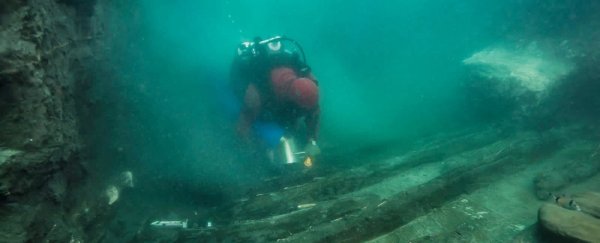Archaeologists have discovered the 2,200-year-old wreck of an ancient Egyptian ship that sank after being struck with giant blocks from the famous temple of Amun.
The so-called galley, along with a burial ground, were discovered beneath the Mediterranean Sea in Thonis-Heracleion, a city that fell into the water long ago.
The ship is called a fast galley, a type of vessel with a large sail that would have been propelled to relatively high speeds by a team of oarsmen. The recently discovered fast galley is 82 feet (25 meters) long with a flat keel, a feature that is commonly found among ancient vessels that navigated the Nile River.
It "sank after being hit by huge blocks from the famed temple of Amun, which was totally destroyed [during] a cataclysmic event in the second century [BCE]," a team of archaeologists said in an emailed statement released by the European Institute for Underwater Archaeology.
 (Christoph Gerigk/FranckGoddio/Hilti Foundation)
(Christoph Gerigk/FranckGoddio/Hilti Foundation)
Above: Elaborate offerings were found in the burial ground. The decorated pot in this photo shows what appear to be images of waves.
Related: 8 sunken settlements hidden beneath the waves
That "cataclysmic event" was probably an earthquake, the Egyptian Ministry of Tourism and Antiquities said in a July 19 statement. The galley now lies beneath just over 16 feet (5 m) of clay and rubble from the temple.
Researchers used a new type of sonar to locate it.
"The finds of fast galleys from this period remain extremely rare," Franck Goddio, the president of the European Institute for Underwater Archaeology, said in the institute's statement.
 (Christoph Gerigk/FranckGoddio/Hilti Foundation)
(Christoph Gerigk/FranckGoddio/Hilti Foundation)
Above: This gold amulet was found in the burial ground and depicts Bes, an Egyptian god associated with childbirth and fertility. The ancient Egyptians sometimes used images of this god to protect women giving birth and young children.
The ship was constructed with a mortise-and-tenon technique, in which pieces of wood with protrusions called tenons are placed into pieces of wood with holes called mortises cut into them. The result is a ship made of wood sections that interlock like a jigsaw puzzle. It's not clear what cargo, if any, the galley was carrying when it sank.
Burial ground
At the site of this sunken city, the archaeologists also discovered a burial ground that was in use as far back as 2,400 years ago. The team found elaborately decorated pottery, including one piece that appears to have images of waves painted on it.
Archaeologists also found a gold amulet depicting Bes, an Egyptian god associated with childbirth and fertility. Ancient Egyptians sometimes used images of the god to protect young children and women giving birth.
The burial ground was covered with a large tumulus, a pile of rocks that was commonly used in the ancient world to mark the locations of burials.
 (Christoph Gerigk/FranckGoddio/Hilti Foundation)
(Christoph Gerigk/FranckGoddio/Hilti Foundation)
Above: Blocks from the Temple of Amun fell on the galley, sinking the ship.
Egyptian and Greek influences
The ancient city where the discoveries were made was known as Thonis to its Egyptian inhabitants and Heracleion to its Greek inhabitants; as such, modern-day archaeologists call it Thonis-Heracleion.
A series of earthquakes resulted in the city gradually falling into the sea, until it was completely underwater about 1,000 years ago.
The city flourished at a time when many Greeks were coming to Egypt and bringing their cultural traditions with them. In 332 BCE, Alexander the Great conquered Egypt and a line of rulers descended from one of his generals would rule Egypt for three centuries.
The city was rediscovered by archaeologists with the Antiquities Ministry and the European Institute for Underwater Archaeology in 1999–2000. They have been studying the remains ever since.
Related content:
In photos: The life and death of King TutThe life and death of King Tut
Photos: Ancient Egyptian general's tomb discovered in Saqqara
In photos: 3,300-year-old Egyptian carving
This article was originally published by Live Science. Read the original article here.
